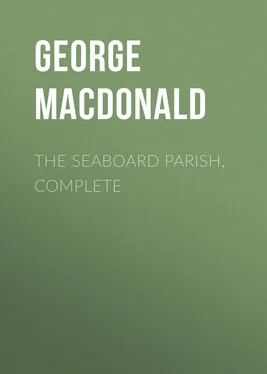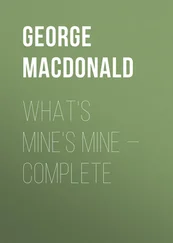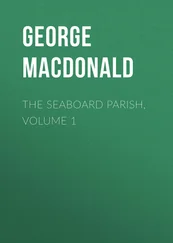George MacDonald - The Seaboard Parish, Complete
Здесь есть возможность читать онлайн «George MacDonald - The Seaboard Parish, Complete» — ознакомительный отрывок электронной книги совершенно бесплатно, а после прочтения отрывка купить полную версию. В некоторых случаях можно слушать аудио, скачать через торрент в формате fb2 и присутствует краткое содержание. Жанр: foreign_prose, literature_19, foreign_antique, на английском языке. Описание произведения, (предисловие) а так же отзывы посетителей доступны на портале библиотеки ЛибКат.
- Название:The Seaboard Parish, Complete
- Автор:
- Жанр:
- Год:неизвестен
- ISBN:нет данных
- Рейтинг книги:3 / 5. Голосов: 1
-
Избранное:Добавить в избранное
- Отзывы:
-
Ваша оценка:
- 60
- 1
- 2
- 3
- 4
- 5
The Seaboard Parish, Complete: краткое содержание, описание и аннотация
Предлагаем к чтению аннотацию, описание, краткое содержание или предисловие (зависит от того, что написал сам автор книги «The Seaboard Parish, Complete»). Если вы не нашли необходимую информацию о книге — напишите в комментариях, мы постараемся отыскать её.
The Seaboard Parish, Complete — читать онлайн ознакомительный отрывок
Ниже представлен текст книги, разбитый по страницам. Система сохранения места последней прочитанной страницы, позволяет с удобством читать онлайн бесплатно книгу «The Seaboard Parish, Complete», без необходимости каждый раз заново искать на чём Вы остановились. Поставьте закладку, и сможете в любой момент перейти на страницу, на которой закончили чтение.
Интервал:
Закладка:
“Indeed it was, my darling—and a very beautiful and true dream. There is no need for me to moralise it to you, for you have done so for yourself already. But not only do I think that the coming out of sin into goodness, out of unbelief into faith in God, is like your dream; but I do expect that no dream of such delight can come up to the sense of fresh life and being that we shall have when we get on the higher body after this one won’t serve our purpose any longer, and is worn out and cast aside. The very ability of the mind, whether of itself, or by some inspiration of the Almighty, to dream such things, is a proof of our capacity for such things, a proof, I think, that for such things we were made. Here comes in the chance for faith in God—the confidence in his being and perfection that he would not have made us capable without meaning to fill that capacity. If he is able to make us capable, that is the harder half done already. The other he can easily do. And if he is love he will do it. You should thank God for that dream, Connie.”
“I was afraid to do that, papa.”
“That is as much as to fear that there is one place to which David might have fled, where God would not find him—the most terrible of all thoughts.”
“Where do you mean, papa?”
“Dreamland, my dear. If it is right to thank God for a beautiful thought—I mean a thought of strength and grace giving you fresh life and hope—why should you be less bold to thank him when such thoughts arise in plainer shape—take such vivid forms to your mind that they seem to come through the doors of the eyes into the vestibule of the brain, and thence into the inner chambers of the soul?”
CHAPTER XII. THE JOURNEY
For more than two months Charlie and Harry had been preparing for the journey. The moment they heard of the prospect of it, they began to prepare, accumulate, and pack stores both for the transit and the sojourn. First of all there was an extensive preparation of ginger-beer, consisting, as I was informed in confidence, of brown sugar, ground ginger, and cold water. This store was, however, as near as I can judge, exhausted and renewed about twelve times before the day of departure arrived; and when at last the auspicious morning dawned, they remembered with dismay that they had drunk the last drop two days before, and there was none in stock. Then there was a wonderful and more successful hoarding of marbles, of a variety so great that my memory refuses to bear the names of the different kinds, which, I think, must have greatly increased since the time when I too was a boy, when some marbles—one of real, white marble with red veins especially—produced in my mind something of the delight that a work of art produces now. These were carefully deposited in one of the many divisions of a huge old hair-trunk, which they had got their uncle Weir, who could use his father’s tools with pleasure if not to profit, to fit up for them with a multiplicity of boxes, and cupboards, and drawers, and trays, and slides, that was quite bewildering. In this same box was stowed also a quantity of hair, the gleanings of all the horse-tails upon the premises. This was for making fishing-tackle, with a vague notion on the part of Harry that it was to be employed in catching whales and crocodiles. Then all their favourite books were stowed away in the same chest, in especial a packet of a dozen penny books, of which I think I could give a complete list now. For one afternoon as I searched about in the lumber-room after a set of old library steps, which I wanted to get repaired, I came upon the chest, and opening it, discovered my boys’ hoard, and in it this packet of books. I sat down on the top of the chest and read them all through, from Jack the Giant-killer down to Hop o’ my Thumb without rising, and this in the broad daylight, with the yellow sunshine nestling beside me on the rose-coloured silken seat, richly worked, of a large stately-looking chair with three golden legs. Yes I could tell you all those stories, not to say the names of them, over yet. Only I knew every one of them before; finding now that they had fared like good vintages, for if they had lost something in potency, they had gained much in flavour. Harry could not read these, and Charlie not very well, but they put confidence in them notwithstanding, in virtue of the red, blue, and yellow prints. Then there was a box of sawdust, the design of which I have not yet discovered; a huge ball of string; a rabbit’s skin; a Noah’s ark; an American clock, that refused to go for all the variety of treatment they gave it; a box of lead-soldiers, and twenty other things, amongst which was a huge gilt ball having an eagle of brass with outspread wings on the top of it.
Great was their consternation and dismay when they found that this magazine could not be taken in the post-chaise in which they were to follow us to the station. A good part of our luggage had been sent on before us, but the boys had intended the precious box to go with themselves. Knowing well, however, how little they would miss it, and with what shouts of south-sea discovery they would greet the forgotten treasure when they returned, I insisted on the lumbering article being left in peace. So that, as man goeth treasureless to his grave, whatever he may have accumulated before the fatal moment, they had to set off for the far country without chest or ginger-beer—not therefore altogether so desolate and unprovided for as they imagined. The abandoned treasure was forgotten the moment the few tears it had occasioned were wiped away.
It was the loveliest of mornings when we started upon our journey. The sun shone, the wind was quiet, and everything was glad. The swallows were twittering from the corbels they had added to the adornment of the dear old house.
“I’m sorry to leave the swallows behind,” said Wynnie, as she stepped into the carriage after her mother. Connie, of course, was already there, eager and strong-hearted for the journey.
We set off. Connie was in delight with everything, especially with all forms of animal life and enjoyment that we saw on the road. She seemed to enter into the spirit of the cows feeding on the rich green grass of the meadows, of the donkeys eating by the roadside, of the horses we met bravely diligent at their day’s work, as they trudged along the road with wagon or cart behind them. I sat by the coachman, but so that I could see her face by the slightest turning of my head. I knew by its expression that she gave a silent blessing to the little troop of a brown-faced gipsy family, which came out of a dingy tent to look at the passing carriage. A fleet of ducklings in a pool, paddling along under the convoy of the parent duck, next attracted her.
“Look; look. Isn’t that delicious?” she cried.
“I don’t think I should like it though,” said Wynnie.
“What shouldn’t you like, Wynnie?” asked her mother.
“To be in the water and not feel it wet. Those feathers!”
“They feel it with their legs and their webby toes,” said Connie.
“Yes, that is some consolation,” answered Wynnie.
“And if you were a duck, you would feel the good of your feathers in winter, when you got into your cold bath of a morning.”
I give all this chat for the sake of showing how Connie’s illness had not in the least withdrawn her from nature and her sympathies—had rather, as it were, made all the fibres of her being more delicate and sympathetic, so that the things around her could enter her soul even more easily than before, and what had seemed to shut her out had in reality brought her into closer contact with the movements of all vitality.
We had to pass through the village to reach the railway station. Everybody almost was out to bid us good-bye. I did not want, for Connie’s sake chiefly, to have any scene, but recalling something I had forgotten to say to one of my people, I stopped the carriage to speak to him. The same instant there was a crowd of women about us. But Connie was the centre of all their regards. They hardly looked at her mother or sister. Had she been a martyr who had stood the test and received her aureole, she could hardly have been more regarded. The common use of the word martyr is a curious instance of how words get degraded. The sufferings involved in martyrdom, and not the pure will giving occasion to that suffering, is fixed upon by the common mind as the martyrdom. The witness-bearing is lost sight of, except we can suppose that “a martyr to the toothache” means a witness of the fact of the toothache and its tortures. But while martyrdom really means a bearing for the sake of the truth, yet there is a way in which any suffering, even that we have brought upon ourselves, may become martyrdom. When it is so borne that the sufferer therein bears witness to the presence and fatherhood of God, in quiet, hopeful submission to his will, in gentle endurance, and that effort after cheerfulness which is not seldom to be seen where the effort is hardest to make; more than all, perhaps, and rarest of all, when it is accepted as the just and merciful consequence of wrong-doing, and is endured humbly, and with righteous shame, as the cleansing of the Father’s hand, indicating that repentance unto life which lifts the sinner out of his sins, and makes him such that the holiest men of old would talk to him with gladness and respect, then indeed it may be called a martyrdom. This latter could not be Connie’s case, but the former was hers, and so far she might be called a martyr, even as the old women of the village designated her.
Читать дальшеИнтервал:
Закладка:
Похожие книги на «The Seaboard Parish, Complete»
Представляем Вашему вниманию похожие книги на «The Seaboard Parish, Complete» списком для выбора. Мы отобрали схожую по названию и смыслу литературу в надежде предоставить читателям больше вариантов отыскать новые, интересные, ещё непрочитанные произведения.
Обсуждение, отзывы о книге «The Seaboard Parish, Complete» и просто собственные мнения читателей. Оставьте ваши комментарии, напишите, что Вы думаете о произведении, его смысле или главных героях. Укажите что конкретно понравилось, а что нет, и почему Вы так считаете.












